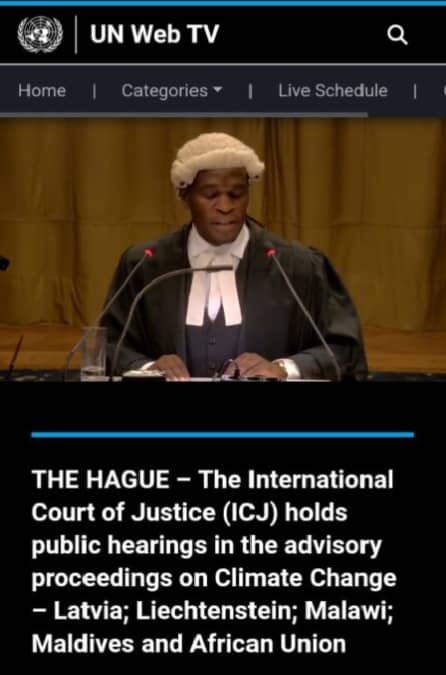
On December 6, 2024, Malawian advocates led by Attorney General Thabo Chakaka Nyirenda made a groundbreaking appearance before the International Court of Justice (ICJ) in The Hague, marking a significant moment in the advocacy for climate justice as they argued a case focusing on the “Obligations of States in Respect of Climate Change.” This represents the first time Malawi has formally presented a case at the ICJ, underscoring the nation’s commitment to addressing the pervasive impacts of climate change and seeking accountability from countries deemed responsible.
The legal team, which included the Attorney General also featured senior state advocates Mr. John Chaula and Ms. Nafisa Shareef, alongside international law experts Ms. Tafadzwa Pasipanodya from Foley Hoag and Dr. Manuel Casas of Twenty Essex, presented Malawi’s case in the context of a request for an advisory opinion based on General Assembly Resolution 77/276. Their arguments underscored the urgent need for a global acknowledgment of climate change as a pressing threat to humanity and the moral and legal obligations of nations contributing to its escalation.
The Malawian delegation emphatically rejected the assertion made by some states that international law reduced climate obligations solely to climate change treaties. They argued that such a stance is not only unduly restrictive but also ignores the broader principles encapsulated in customary international law, particularly the obligation of states to prevent substantial transboundary harm.
In a poignant part of his submission, Attorney General Nyirenda stated, “Virtually every participant has emphasized the grave threat that the climate crisis poses to humanity. Yet, a small cohort of States contend that international law is silent on this issue. This position is incorrect and invites the dangerous disregard of customary international law.” He invoked the United Nations Framework Convention on Climate Change (UNFCCC), emphasizing its clear objective to stabilize greenhouse gas concentrations and the inherent obligation to prevent environmental harm across borders.
Malawi’s argument extended to a demand for reparations from states that have historically contributed to climate change. As one of the world’s Least Developed Countries (LDCs), Malawi has faced the catastrophic consequences of climate-driven disasters, which have resulted in loss of life and destruction of vital infrastructure. The Malawian legal team asserted that those countries found to be responsible for exacerbating global warming have a legal and moral obligation to provide reparations to nations suffering from its effects.
“An internationally wrongful act of a State triggers specific legal consequences,” Nyirenda articulated. “There is no justifiable reason to exempt climate change from those generally applicable rules.” He emphasized that the court must affirm the applicability of international norms relating to state responsibility and guide future reparations claims.
The submission also stressed that reparations should encompass various forms of restitution. This includes the cessation of harmful practices, assurance of non-repetition through binding domestic policies, and compensation mechanisms ranging from the creation of adaptation funds to potential debt cancellation for severely impacted LDCs such as Malawi.
The degradation of the environment and the resultant vulnerabilities befalling Malawi cannot be understated. The country has experienced recurrent climate-related disasters, which have set back development efforts significantly and are estimated to require at least a decade for full recovery. The legal representatives called upon the ICJ to ensure that the voices of those suffering the worst effects of climate change be heard and that reparative justice be achieved through appropriate legal remedies.
By boldly advocating for justice at the ICJ, Malawi not only seeks to address its own suffering but also aims to set a precedent for other affected nations, creating a collective movement towards accountability and reparative measures in the face of a mounting global crisis.
Climate advocates and enthusiasts across the world have their eyes on the ICJ in anticipating its decision, highlighting the gravity of climate justice and the critical need for a united international front in combating the far-reaching implications of climate change. Malawi’s historic case may very well lay the groundwork for future legal battles, shaping a more equitable global response to the climate crisis.


